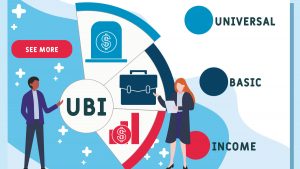Unconditional cash payments to residents are more of a floor to stand on than a safety net, say these Carolina scholars in light of a proposed pilot project to give $500 per month to formerly incarcerated Durham, North Carolina, residents.

The idea of governments giving residents no-strings-attached cash payments is picking up steam, due in part to the economic impact of the coronavirus pandemic. Last June, Mayor Michael Tubbs of Stockton, California, created Mayors for a Guaranteed Income, a coalition to “advocate for a guaranteed income — direct, recurring cash payments — that lifts all of our communities, building a resilient, just America.”
Durham Mayor Steve Schewel joined the group. In January, Schewel announced that Durham was one of 30 U.S. cities being considered to receive a $500,000 slice of a $15 million gift from Twitter co-founder and CEO Jack Dorsey. The money would fund Universal Basic Income pilot projects, such as the Stockton Economic Empowerment Demonstration. Durham council member Mark-Anthony Middleton announced that Durham’s proposed project would guarantee $500 per month to 55 formerly incarcerated residents until the pandemic ends and the city’s economy recovers.
Before the pandemic hit, 2020 Democratic presidential candidate Andrew Yang put UBI, also known as guaranteed basic income, on the map by making it his signature policy. His proposed “Freedom Dividend” — $1,000 per month payments to every American adult — was a response to job displacement by automation.
For a deeper understanding of this issue, The Well spoke with two Carolina faculty members who have studied UBI. Fabian Wendt, a teaching assistant professor in the College of Arts & Sciences’ philosophy department and the philosophy, politics & economics program, first came across UBI while studying theories of distributive justice. Doug MacKay, associate professor in the College’s public policy department, grew interested in UBI through research into paternalism in the U.S. social safety net.
What is universal basic income?

Wendt: It is a regular cash payment by the government that is given on a monthly or annual basis. It’s unconditional in several respects. In contrast to many other welfare programs that you only get when you prove your willingness to work, a UBI would be unconditional in that respect. It would also be unconditional on what money you make, what you have in general and on what contribution you made to finance the UBI. Finally, it would be unconditional on your family situation, on whether you’re married or not.
UBI is probably best conceived as a floor to stand on, not as a safety net. A safety net is only meant to catch you when you need it, which requires some institution to test whether you really need it, and that opens up all these worries about paternalism, bureaucracy and so on, whereas the UBI would be a floor to stand on for everybody.
MacKay: I completely agree with Fabian’s description. UBI is a platform to stand on and to build a life on. But it’s not something that’s going to allow you to live a great life. The sort of numbers that we’re talking about are, at most, $1,000 a month per person. People will still have a strong motivation to work.
What are the goals of UBI?
MacKay: The goals really differ, depending on the policymaker but also on who’s proposing it. I think for a lot of folks on the left, they see it as more a platform to build your life on. So it’s going to be there for you when you when you need it.
If you think about the pandemic, when people are losing their jobs, it takes a long time for government to react. Had we had a basic income in place, that would have been a way of ensuring people are secure, have the ability to meet their basic needs and live a dignified human life. They don’t need to appeal to various agencies. They have consistency in terms of being able to afford housing, food and so on. It’s an anti-poverty measure.
You also see from people on the left the idea of UBI as promoting freedom. Oftentimes we talk about freedom as being freedom from constraints. Some folks on the right, libertarians in particular, emphasize the need for government to stay out of our lives. And thinkers on the left often point out that if people are just leaving you alone, you might be unlimited in terms of choices, but you’re not actually going to be able to do anything unless you have resources. So the idea is that if people have a platform to build their lives off, they have resources every month. They can actually do things. They can meet their needs. They can pursue various projects.
On the right side of the political spectrum, people see UBI as potentially realizing a number of goals. One, they emphasize this is anti-paternalistic in nature. There’s an element of government not interfering with the lives of individuals by imposing all these conditionalities on them, but rather just letting them be free to live their lives as they see fit with the income.

The other thing that folks on the right emphasize is the way UBI might allow you to shrink the size of government. People on the left often think of basic income as something we’re going to add to the safety net and keep much of the safety net intact. People on the right often see it as a replacement: We’re going to give people a guaranteed income, and we’re going to get rid of a whole host of social safety net programs that cost a lot of money and require a lot of people to administer.
Wendt: One thing I found interesting about Andrew Yang’s proposal was his idea to let people choose whether they either take the UBI or keep the benefits from current programs.
Another thing different proponents will disagree upon is how high UBI should be. A thousand dollars a month was Yang’s proposal, but you could also go much lower or much higher. Maybe even “as high as is sustainable,” as [Belgian philosopher and economist and chief UBI proponent Philippe] Van Parijs would say.
Its sustainability will depend on how high it is pitched, but also on how it’s financed. It seems very natural to think that it would be financed through the income tax. That would make it a close relative to a negative income tax proposal, which was popular in the 1960s and ’70s. [The influential American economist] Milton Friedman was a famous advocate of that. But Andrew Yang and others propose a mix in terms of how it’s financed. It could also be a sales tax or capital income tax or some other way.
Andrew Yang put UBI on the map, but what’s driving it and why now?
Wendt: UBI has often been seen as a response to the challenge of automation — the worry that many people are going to become unemployed and replaced by machines. For example, truck drivers will lose their jobs once there are automated trucks. In the end, that’s not a new concern, though. People have worried that machines would replace jobs at least since the 19th century, but usually new types of jobs were always created elsewhere.
The idea of a UBI was brought up last spring as a response to the pandemic — an emergency UBI. The coronavirus hit so hard. Many people felt like this was a chance to get some serious reform of the welfare state going. In the end we got the stimulus checks instead, which were not completely different, but a one-time thing, and not unconditional. The checks depended on how much you earned.
One thing to emphasize is also how UBI would empower women. It gives working mothers cash to pay for childcare, for example, or it makes it easier to leave an abusive husband if you have something to rely on that is independent from the family situation.
MacKay: The other thing I would point to are concerns about income inequality. I don’t think this is necessarily a great solution to the problem of income inequality, but I think the economic anxiety leads people to UBI.
Is there evidence that UBI works?
MacKay: There’s been a variety of studies. There were a couple of really famous experiments in the ’70s in Canada and here in the United States. There was a really interesting study in Manitoba in the late ’70s, where they had a whole town that was subject to a guaranteed income policy — a floor that families would not fall below. A lot of randomized controlled trials in low-income countries have been using cash transfers since the late ’80s, early ’90s. Some of these are conditional cash transfers. In Mexico, for example, you might get a cash transfer from the government if you send your kids to school and take them for yearly doctor visits. And there was one recently in Finland, where they gave $500 per month to unemployed folks.
These are high-quality studies. The evidence has shown that the UBI programs are pretty effective in a number of different ways. The caveat I would give is that they happen in different contexts, and the interventions are very different.
Wendt: An experiment in Kenya is the largest. It involves around 20,000 people and unconditional cash payments that cover basic needs. It started in 2017 and will last 12 years. There are four different groups. One group gets the cash for the whole 12 years. Another group gets paid up front rather than on a monthly basis, I believe. Another group receives payments for a shorter period of time. And then there’s a control group that doesn’t get any cash. Some people reported that it has changed how women see their role in the household, because they felt entitled to have a say over how to spend the money.
What are the main points of criticism against UBI?
MacKay: A big one is a reciprocity worry — that in order to get access to public benefits, you should be at least willing to participate in the labor market.
Think of the earned-income tax credit. That’s a cash transfer that goes to low-income Americans. But to get access to it, you need to be participating in the labor force. A lot of programs like SNAP [the federal government’s Supplemental Nutrition Assistance Program, also known as the Food Stamp Program] and TANF [Temporary Assistance for Needy Families, another federal program] have work requirements attached to them. The Trump administration was trying to attach a work requirement to Medicaid programs, as well. The thought is, you should only get access to public benefits if you are participating in the formal labor market and earning an income.
The question they ask is: Why should some group of individuals be participating in the labor force and paying taxes to fund a UBI for other people who aren’t participating in the labor market? One of the responses to this is that UBI recognizes all those forms of contribution to society that aren’t remunerated. Think about parents taking care of their children or poor people taking care of elderly family members. There’s lots of ways in which people contribute to society. And you can think of a UBI as reciprocating in that sense, remunerating people for those contributions.
Wendt: Another common worry is that UBI is a waste of money on the wealthy. Why should all of those wealthy people get a monthly check? If the goal is to do something about poverty, then why UBI, since the rich by definition are not poor? That’s an understandable concern for sure. But the reply there is that depending on how the UBI is financed, the rich will not be net beneficiaries. They will contribute more to finance the UBI than what they get as their monthly check.
What do you think about the Durham proposal?
MacKay: This is the first time I’ve heard of a guaranteed income program that’s aimed at people coming out of prison. I think it makes perfect sense. Part of the justification here is that people with a felony record face a lot of difficulty in terms of accessing other public programs. I think they’re actually banned for at least some period of time from federal housing programs and from receiving SNAP benefits. Felons face a lot of difficulty getting jobs. Employers can legitimately ask if they have a record and deny them employment on that basis. So it makes a lot of sense that you would target this type of pilot project at those folks. If you think about who needs a platform in American society, it’s going to be people who don’t have access to these other programs and are economically vulnerable in terms of not being able to get a job. And so I think it makes a lot of sense that you would target the program this way.
Oftentimes we discuss UBI as a major transformation to society, as a sort of utopian policy. That draws a lot of attention. But I think the discussion might lead to a simpler idea — just using cash payments in more of our social safety net programs. That might be more sustainable, more cost effective, than trying to try to implement a full UBI type policy. For that reason, what’s happening in Durham — a guaranteed income for a very narrow group of individuals — is really interesting.
One thing the pandemic has shown us is that the government got a little bit more comfortable with giving cash payments to people. Another thing I’m really excited about are these proposals to expand the child tax credit, both coming from [Mitt] Romney and also coming from the Democrats, which you might think of as a basic income for kids. Every month, they would get a certain amount of money, maybe a few hundred dollars. The parents decide how to spend it, but the thought is it’s kind of like a baseline for kids. We don’t want to spend too much time focusing on the big UBI utopian policy proposals and miss that there’s a lot of interesting and potentially really important, cost-effective policy proposals around using cash payments in very targeted ways.
By Logan Ward, The Well
